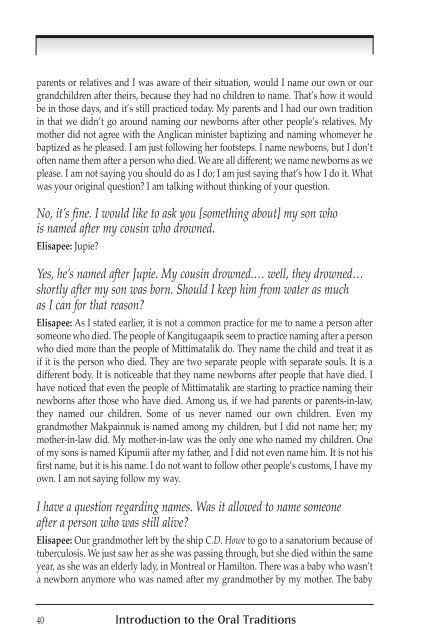Introduction-E
Introduction-E
Introduction-E
You also want an ePaper? Increase the reach of your titles
YUMPU automatically turns print PDFs into web optimized ePapers that Google loves.
parents or relatives and I was aware of their situation, would I name our own or our<br />
grandchildren after theirs, because they had no children to name. That’s how it would<br />
be in those days, and it’s still practiced today. My parents and I had our own tradition<br />
in that we didn’t go around naming our newborns after other people’s relatives. My<br />
mother did not agree with the Anglican minister baptizing and naming whomever he<br />
baptized as he pleased. I am just following her footsteps. I name newborns, but I don’t<br />
often name them after a person who died. We are all different; we name newborns as we<br />
please. I am not saying you should do as I do; I am just saying that’s how I do it. What<br />
was your original question? I am talking without thinking of your question.<br />
No, it’s fine. I would like to ask you [something about] my son who<br />
is named after my cousin who drowned.<br />
Elisapee: Jupie?<br />
Yes, he’s named after Jupie. My cousin drowned.… well, they drowned…<br />
shortly after my son was born. Should I keep him from water as much<br />
as I can for that reason?<br />
Elisapee: As I stated earlier, it is not a common practice for me to name a person after<br />
someone who died. The people of Kangitugaapik seem to practice naming after a person<br />
who died more than the people of Mittimatalik do. They name the child and treat it as<br />
if it is the person who died. They are two separate people with separate souls. It is a<br />
different body. It is noticeable that they name newborns after people that have died. I<br />
have noticed that even the people of Mittimatalik are starting to practice naming their<br />
newborns after those who have died. Among us, if we had parents or parents-in-law,<br />
they named our children. Some of us never named our own children. Even my<br />
grandmother Makpainnuk is named among my children, but I did not name her; my<br />
mother-in-law did. My mother-in-law was the only one who named my children. One<br />
of my sons is named Kipumii after my father, and I did not even name him. It is not his<br />
first name, but it is his name. I do not want to follow other people’s customs, I have my<br />
own. I am not saying follow my way.<br />
I have a question regarding names. Was it allowed to name someone<br />
after a person who was still alive?<br />
Elisapee: Our grandmother left by the ship C.D. Howe to go to a sanatorium because of<br />
tuberculosis. We just saw her as she was passing through, but she died within the same<br />
year, as she was an elderly lady, in Montreal or Hamilton. There was a baby who wasn’t<br />
a newborn anymore who was named after my grandmother by my mother. The baby<br />
40 <strong>Introduction</strong> to the Oral Traditions


